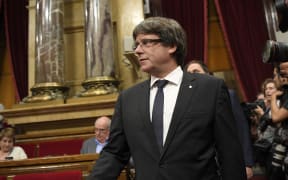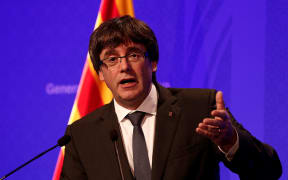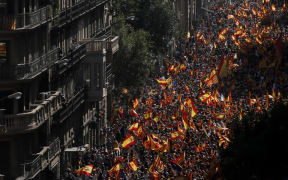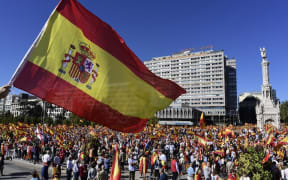Spainish Prime Minister Mariano Rajoy has put Catalonia on notice that it could impose direct rule on the region.
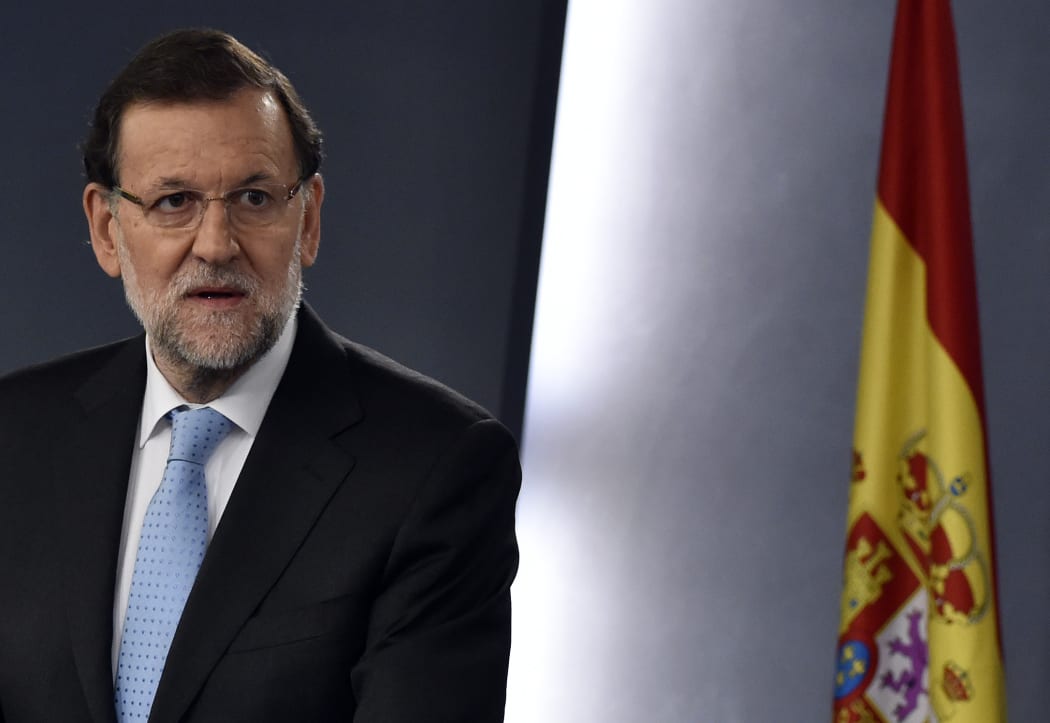
Prime Minister Mariano Rajoy Photo: AFP
The government in Madrid has now given Catalan leader Carles Puigdemont five days to say whether or not he has declared independence, Spanish news agency Efe reports.
The move is the first step towards suspending Catalonia's autonomy under the constitution.
If Mr Puigdemont confirms he has declared independence, he will be given a further three days to withdraw the declaration before Article 155 of the constitution - allowing central government to suspend a region's autonomy and impose direct rule - is invoked, Efe adds.
Catalan leaders signed a declaration of independence on Tuesday but halted implementation to allow for talks.
Spain has been in turmoil since the separatist government held a disputed referendum in Catalonia on 1 October which was declared invalid by the country's Constitutional Court.
Almost 90 percent of voters backed independence with a turnout of 43 percent, Catalan officials said. Anti-independence voters largely boycotted the ballot and there were several reports of irregularities.
National police were involved in violent scenes as they tried to stop the vote taking place.
Mr Rajoy accused Mr Puigdemont of having created "deliberate confusion" and said he wanted to restore "certainty".
"This call - ahead of any of the measures that the government may adopt under Article 155 of our constitution - seeks to offer citizens the clarity and security that a question of such importance requires," Mr Rajoy said.
"There is an urgent need to put an end to the situation that Catalonia is going through - to return it to safety, tranquillity and calm and to do that as quickly as possible."
Mr Rajoy was speaking after holding an emergency cabinet meeting on Wednesday morning to discuss the government's next steps.
Speaking later in parliament, Mr Rajoy said Spain was facing the most serious threat to its 40-year-old democracy.
He accused the separatists of hatching an "anti-democratic plan foisting their will on all the people of Catalonia", and said the Spanish government had no choice but to restore order.
"It falls to the Catalan leader to restore constitutional normality," he told deputies, rejecting any suggestion of outside mediation in the dispute.
He added that he was willing to negotiate on the issue of regional autonomy and changes to the constitution - but this had to be within the framework of the law.
What happens next?
Katya Adler, BBC Europe editor, Madrid
Spain's prime minister tried today to put the ball back in the Catalan court. He's asked the Catalan president to clarify if he is making a declaration of independence or not.
There is no official timeframe for the response, although political sources and Spanish media are now talking about five days (and then there is an argument about whether that includes the weekend and Thursday's national holiday).
In the meantime, sources in the Senate (Spain's upper house of parliament, where Prime Minister Rajoy's Popular Party has a majority) say the request has been made to trigger Article 155 of the Spanish constitution, under which Mr Rajoy would be able to suspend Catalan autonomy - possibly immediately, or bit by bit.
Prime Minister Rajoy has threatened to use Article 155 if Catalan independence is declared, but the article has not yet been activated.
Article 155 has never been used before, so we are in a kind of Brexit situation before Article 50 was triggered. The article legally exists but there are disagreements about how far-reaching it is, how it would/should work (and how quickly) in practice.
Reports in Spanish media suggest that if the Spanish prime minister activates Article 155 in the absence of a response from the Catalan president, pro-independence parties in the Catalan parliament will then declare independence.
The leader of the opposition Socialists, Pedro Sanchez, told reporters that his party and the government had agreed to examine the possibility of using constitutional reform to end the crisis.
This would be focused on "how Catalonia remains in Spain, and not how it leaves", he added.
-BBC
